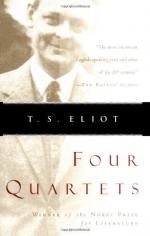
|
| Name: _________________________ | Period: ___________________ |
This test consists of 5 multiple choice questions, 5 short answer questions, and 10 short essay questions.
Multiple Choice Questions
1. What, towards the end of "Burnt Norton"'s first part, rose quietly out of the water that came from sunlight?
(a) The lotos.
(b) Children.
(c) The cloud.
(d) The bird.
2. What is the "dignified and commodious sacrament" mentioned in Part I of "East Coker"?
(a) Baptism.
(b) Communion.
(c) Marriage.
(d) Penance.
3. Of what wisdom does the speaker hope to acquire, as stated near the end of Part II of "East Coker"?
(a) The wisdom of death.
(b) The wisdom of God.
(c) The wisdom of humility.
(d) The wisdom of old men.
4. Which of the following does the speaker wish to hear of concerning old men, in "East Coker," Part II?
(a) Their loves.
(b) Their lives.
(c) Their wisdom.
(d) Their folly.
5. What is disturbed on the bowl of rose-leaves, as mentioned in the first part of "Burnt Norton"?
(a) The bird.
(b) Dust.
(c) Time future.
(d) Memory.
Short Answer Questions
1. The speaker asks, in "Burnt Norton," Part IV, if chill fingers of what "be curled / Down on us"?
2. Only by what does the speaker postulate in Part V of "Burnt Norton," that words or music can reach the stillness?
3. In the fifth part of "East Coker" the speaker claims that there is only the fight to do what?
4. Which of the following is not cataloged by the speaker as something "long looked forward to" in the second part of "East Coker"?
5. What is the last phrase of Part I of "East Coker"?
Short Essay Questions
1. How is the "here" of Part III of "Burnt Norton" described, and what is significant about this description?
2. What is signified by the phrase in Part III of "East Coker," "the growing terror of nothing to think about"?
3. What does the speaker mean when he states in Part V of "East Coker" that "there is no competition - / There is only the fight to recover what has been lost And found and lost again and again"?
4. What are the other echoes which inhabit the rose-garden in Part I of "Burnt Norton"?
5. What does the speaker mean in Part II of "Burnt Norton" when he states at the still point of the turning world, "there the dance is, / But neither arrest nor movement"?
6. What is meant by "Only by the form, the pattern, / Can words or music reach / The stillness" in "Burnt Norton"'s fifth part?
7. What is meant in the lines, "But to what purpose... I do not know," in the first part of "Burnt Norton"?
8. What does the speaker mean by commanding, in Part III of "East Coker," that one wait without hoping or loving, and that "the faith and the love and the hope are all in the waiting"?
9. What is a possible interpretation of the fourth part of "Burnt Norton"?
10. Why does the speaker of "East Coker" want only to hear of the folly of old men, in Part II of "East Coker"?
|
This section contains 1,011 words (approx. 4 pages at 300 words per page) |

|




